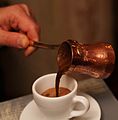Cezve
This article needs attention from an expert in Arab world. See the talk page for details. (August 2023) |

A cezve (
Arabic: جِذوَة), also ibriki/briki (Greek: μπρίκι), srjep (Armenian: սրճեփ) is a small long-handled pot with a pouring lip designed specifically to make Turkish coffee
. It is traditionally made of brass or copper, occasionally also silver or gold. In more recent times cezveler are also made from stainless steel, aluminium, or ceramics.
Name
This article should specify the language of its non-English content, using {{lang}}, {{transliteration}} for transliterated languages, and {{IPA}} for phonetic transcriptions, with an appropriate ISO 639 code. Wikipedia's multilingual support templates may also be used. (January 2023) |
The name cezve is of
Arabic
: جِذوَة (jadhwa or jidhwa, meaning 'ember').
The cezve is also known as an ibrik, a Turkish word from Arabic إبريق (ʿibrīq), from Aramaic ܐܖܪܝܩܐ (ʾaḇrēqā), from early Modern Persian *ābrēž (cf. Modern Persian ābrēz), from Middle Persian *āb-rēǰ, ultimately from Old Persian *āp- 'water' + *raiča- 'pour' (cf. Modern Persian and Middle Persian ریختن [rêxtan]).[1][2]
Variations
In Bulgaria, Albania, Bosnia and Herzegovina, Croatia, Czechia, Montenegro, North Macedonia, Serbia, Slovakia and Slovenia, the cezve is a long-necked coffee pot. In Turkish an ibrik is not a coffee pot, but simply a pitcher or
ewer
.
Gallery
-
Copper cezve with Turkish coffee pouring out
-
Utensils to prepare Turkish coffee (handmade from Crete). A cezve is at the bottom.
-
Turkish coffee set containing a cup of coffee, a cezve and a sugar bowl
See also
- Dallah (Arabic coffee pot)
- Jebena (Ethiopian coffee pot)
- Arabic coffee
- Turkish coffee
- List of cooking vessels
References
- ISBN 978-81-206-0670-8. page 8.
- ISBN 9789004343047.
Sources
- alt.coffee thread archive regarding cezve word origin Archived 2011-05-14 at the Wayback Machine
- Comech's cezve page at tamu.edu Archived 2011-05-14 at the Wayback Machine



